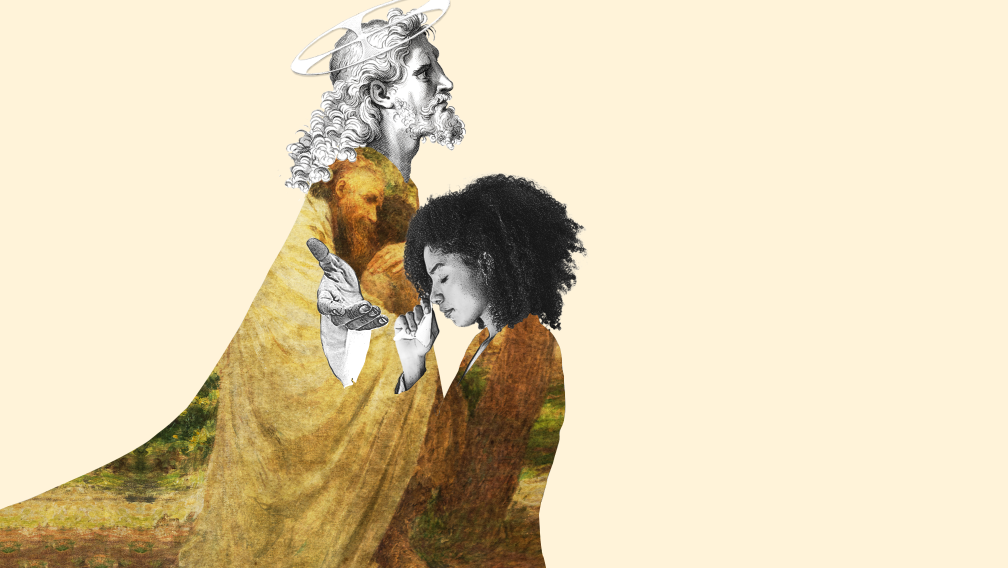God’s Welcoming Embrace

“But while he was still far off, his father saw him and was filled with compassion; he ran and put his arms around him and kissed him.” — Luke 15:20
When Jesus shares the Parable of the Prodigal Son, he’s sitting in a crowd made up of two distinct groups: On one side, you have the “sinners and the tax collectors” — the ones who’ve messed up time and again. On the other side, you have the religious elite — those who’ve done things right their whole lives. At least this is how things look on the surface. Jesus, sitting in the middle, tells the story for the benefit of both.
In the parable, there are two brothers. The younger brother goes to his father and demands his inheritance. With no regard for anyone but himself, he sets off with a pile of cash to do whatever he pleases. He squanders it all. The older brother stays behind and follows the rules. He does what is expected of him, much like the religious leaders in the crowd. (The elite are listening to Jesus’s story, probably assuming it ends with the reckless younger brother getting what he deserves; we might imagine the sinners in the crowd hoping for a different ending.)
The younger son, now regretful and penniless, walks home, thinking of all the things he can say to convince his father to accept him. His father sees his approach and is filled not with anger but with compassion. He runs to his son with open arms. Instead of scolding him, he welcomes him. “Let us eat and celebrate,” he says, “for this son of mine was dead and is alive again; he was lost and is found!”
The older brother isn’t so happy. In fact, he’s furious. He refuses to join the festivities. “For all these years . . . I have never disobeyed your command,” he says, and yet you’ve never thrown a party for me. He doesn’t feel he’s gotten what he deserves. His father reassures him of his love but says it’s time to celebrate his brother’s return.
We read this as the parable of one son — the one gone astray. But the reality is this is the story of the prodigal sons: The younger brother gets lost in his wandering, but the older brother gets lost right where he is. The younger brother loses his way living lavishly and the older brother is stuck trying to do what’s right for his own gain. Though we see them differently, ultimately both brothers are focused on themselves. Their instincts for self-preservation get in the way of their relationships with their father — and with each another. The story ends with the older brother standing outside the party, deciding if he wants to go in.
“I am the prodigal son,” writes theologian Henri Nouwen, “every time I search for unconditional love where it cannot be found.” This story reminds us we are all lost — looking for love, acceptance, and peace in places and practices that will never satisfy us — but God has already found us. Each day, God meets us on the road and invites us home again. The question for each of us is how we’ll respond. Will we fall into God’s embrace? Or will we stand outside, stewing in resentment?
The Rev. Yein Kim
Mother Yein Kim is priest and associate director, Sacramental Life and Membership.
Read all of Sunday’s Scriptures
Step Into the Story
Here are some ways to think about what it means to be lost — and found.
Theology
“It is much easier to see things as all-good or all-bad, rather than both crucified and resurrected at the same time, as Christ is,” writes Father Richard Rohr, speaking to our tendency to cram our complicated lives into unhelpful binaries that pit us against one another and breed resentment. When we avoid the shadows, we fail to see our lives as they really are, and we are unable to join Jesus in his work of redemption.
Spiritual Practice
We might interpret the story of the prodigal sons as a lesson in what happens when we avoid the complications of our lives: We act out like the younger brother or shut down like the older brother. Lent is an apt time to be curious about our motivations and to remember God is always inviting us to relationship. “[Lenten] fasting connects to our bodies as we learn to sit with discomfort,” writes the Rev. Kristin Kaulbach Miles. “Instead of filling a void, we make space. And in that stillness, we pay attention to what’s holy — what’s healing. Holiness brings us back to unity with God and with one another.”
Poetry
“I know the impulse to run, to turn fist, to hurt back,” writes poet Rosemerry Wahtola Trommer, “I know, too, the warmth of cell-deep love — how it spreads through the body like ocean wave, how it doesn’t erase anger and fear, rather seeds itself somehow inside it . . .”





